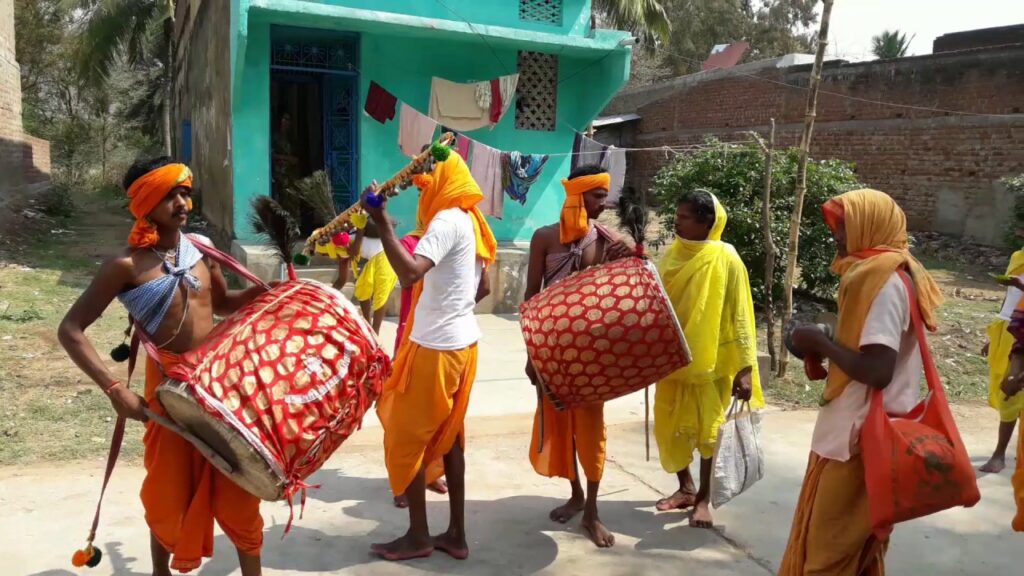The folk dance signifies the dance of the common people of the villages. Danda Nacha Since pre-historic times, dance forms owe their origin to the traditional folk culture. Folk dances, essentially are the fragrance of the soul of the village life and are vibrant with rural sentiments of the people. Even though folk dances are performed for the sake of enjoyment and amusement, they serve as a bridge of social unity. No festivals, ceremonies or celebrations are complete without a dance performance.
Regardless of its geographic distinction, every community or tribe boats its distinctive variety of folk dance. Ganjam district of Odisha since ages has been the living identity of Danda Nacha, a traditional form of folk dance.
Danda Nacha is not only restricted to the district of Ganjam, but is also prominently performed in Puri, Ganjam, Balangir, Sambalpur, Phulbani and Dhenkanal. In its literal terms, Danda means a pole and Nacha means dance or performing arts but in religious terms, it means penance. The dance is performed to worship Lord Shiva and Goddess Kali.
History of Danda Nacha
After the degradation of Buddhism in Odisha during the 8th century AD and during the period of the inception of tantricism, Danda Nacha traces its origin. Consequently, Saivism emerged as a popular religion in Odisha mostly for the untouchables and low caste people. The poor and untouchables started worshipping Lord Shiva outside the Hindu temples, because the upper caste monopolised the privilege of entering into the Hindu temple. Hence, started their rites and rituals of worshipping Shiva by observing a festival annually known as Danda Nacha. In due course of time, Danda Nacha became a part and parcel of their life and finally took the name of a tradition.
Whoever desires irrespective of their caste, creed, social and economic status may join it as a devotee or bhakta, generally referred to as Dandua or Rishi putra, as there is no caste distinction in Danda Nacha. The only restriction is female participation. Bhaktas stay in the group avoiding all contact with women or anything worldly in nature and lead an ascetic life during the period of the Danda Nacha.
The head performer of the Danduas is called Pata Dandua or Pata Bhakta. Generally, the Danduas are segregated into groups, one for the rituals and the other, a group of artists who perform the folk dance. The performers wander from village to village and perform the Nacha at a house or common place when given invitation.

Instruments Used
While performing Danda Nacha musical instruments such as Dholo (drum), Jhanja (Cymbals), Mahuri or Kahali (Trumpet), Magaravina (a bow with a jingling bells), Mukhavina (a shahanai like wind instrument), Gini and Kartal etc. accompany.
Phases of Danda Nacha
Generally, Danda Nacha is performed in four phases namely, the Bandana (morning), Dhuli Danda (mid-day), Pani or Jala Danda (evening) and Agni Danda (midnight). Once the performance is over, the danduas leave the villages in the morning in a procession while beating of the drums along with the images of deities to the doors of the next sponsored bhakta where they would repeat the routine nata performance in the similar manner. They repeat the routine in various places for the entire period, either 13 or 21 days.
You can read our another post on Progress of Bee Keeping in Odisha
Mirror to Societal Beliefs
Danda Nacha aims at arousing religious fervour and entertaining aesthetic pleasure among the spectators. The main aim of Danda Nacha is to promote spiritual upliftment through self-discipline. People pay reverence to the Danda dancers for their observance of religious rites during the course of their dance and is generally associated with agricultural activities like ploughing, sowing, reaping and harvesting of paddy.
From time immemorial, the oral tradition of performing art in varied forms has been maintained by the village folk with the twin objectives of aesthetic pleasure and education. Hence, apart from entertaining the village people with varieties of dances and songs, the main objective is to impart moral teachings in order to remove superstitions and blind faiths that exist in the present-day society.
Conclusion
Danda Nacha is not only a popular folk dance of Odisha but also largely contributes in promoting social harmony, cultural values, spiritual upliftment, taste for music and performing art in and around the state.
This popular folk dance of Ganjam is mainly based on the traditional mythological legends. It influences the society to a large extent by creating the sense of patriotic spirit, love for literature, belief in God, taste for music, theatre and dance and overall serves as an instrument of social unity.
More: Wanted to download Odishashop.com visit here
